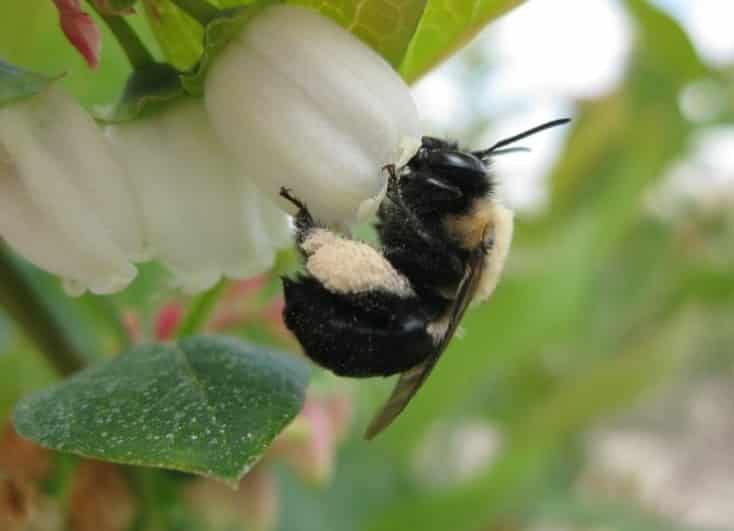Health Editor’s Note: I would say that the bee pollinators have done a bang up job here in blueberry country. 15 minutes is all it takes to get a full bucket of really wonderfully delicious blueberries. Of course that is not counting all the berries that go directly into your mouth. 🙂 … Carol
Wild Bees Are Worth $1.5 Billion for Six U.S. Crops
by Alex Fox/Smithsonianmag.com
A new study finds that the yields of major crops in the United States are frequently limited by a lack of pollinators. The study also highlighted the value of America’s wild bees, estimating they boost yields for six of the country’s seven major crops examined in the study to the tune of $1.5 billion a year, reports Susan Milius for Science News.
The study, published last week in the journal the Proceedings of the Royal Society B, collected data on insect pollination and crop yield from 131 farms in the United States and Canada. At the farms, the researchers focused on seven crops: apples, highbush blueberries, sweet cherries, tart cherries, almond, watermelon and pumpkin, reports Dharna Noor for Gizmodo.
The researchers counted bee visits to flowers on the farms to see which bees were pollinating them and collected data on the resulting crop yields. The team then used statistical models to determine whether those crops could have achieved even higher yields if they’d had more pollinators.
The study found that five of the seven crops are pollination-limited, “meaning crop production would be higher if crop flowers received more pollination,” study author Rachael Winfree, an ecologist at Rutgers University, explains in a statement…..read more:
A new study finds that the yields of major crops in the United States are frequently limited by a lack of pollinators. https://t.co/cmhhg9fti1
— Smithsonian Magazine (@SmithsonianMag) August 5, 2020
By Pollinating Just a Handful of Crops, Wild Bees Contribute Over $1.5 Billion Per Year https://t.co/IhQKgf5jv2
— ScienceAlert (@ScienceAlert) July 29, 2020
"The crops that got more #bees got significantly more crop production." https://t.co/8X9fBoofWK @SoilAssociation
— EcoWatch (@EcoWatch) July 31, 2020
Is #UrbanBeekeeping harming wild bees? 🍯🐝
Gail MacInnis, a postdoctoral researcher at #McGill is studying how beehives are affecting more than 170 wild bee species that live in Montreal, where about 2,000 honeybee hives have been added since 2013.https://t.co/z7LwuEGibN
— McGill University (@mcgillu) August 6, 2020
An article by @BeeBabette on the best method to survey native bees: sweep netting!
— Sonoran Desert Native Bees (@Sonoranbees) August 5, 2020
Researchers estimate that the wild bees contributed $1.06 billion in economic value to crop yields through pollination. https://t.co/qnoOBOQsAG #futureoffood #bees
— Leon Grey (@LeonGreyCo) August 4, 2020

Carol graduated from Riverside White Cross School of Nursing in Columbus, Ohio and received her diploma as a registered nurse. She attended Bowling Green State University where she received a Bachelor of Arts Degree in History and Literature. She attended the University of Toledo, College of Nursing, and received a Master’s of Nursing Science Degree as an Educator.
She has traveled extensively, is a photographer, and writes on medical issues. Carol has three children RJ, Katherine, and Stephen – one daughter-in-law; Katie – two granddaughters; Isabella Marianna and Zoe Olivia – and one grandson, Alexander Paul. She also shares her life with her husband Gordon Duff, many cats, and two rescues.
ATTENTION READERS
We See The World From All Sides and Want YOU To Be Fully InformedIn fact, intentional disinformation is a disgraceful scourge in media today. So to assuage any possible errant incorrect information posted herein, we strongly encourage you to seek corroboration from other non-VT sources before forming an educated opinion.
About VT - Policies & Disclosures - Comment Policy




